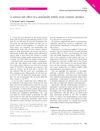Search
forProducts matching "oral finasteride"
Tracking 41 products like 16 Oral Finasteride, 18 Finasteride+Minoxidil+supplement Blend, 30 Finasteride pills, 39 Finasteride and 105 Finasterida 1 mg from by companies like Hims, Keeps, Roman and Dokteronline. View all 41 products »
Sort by
Research
510-540 / 1000+ resultsresearch Faculty Opinions Recommendation of a Randomized, Active- and Placebo-Controlled Study of the Efficacy and Safety of Different Doses of Dutasteride Versus Placebo and Finasteride in the Treatment of Male Subjects with Androgenetic Alopecia

research Pharmacologic Interventions in Aging Hair
Minoxidil and Finasteride are effective for male baldness; more research is needed for hair aging treatments.

research Multi-Therapies in Androgenetic Alopecia: Review and Clinical Experiences
Multiple treatments work best for hair loss.

research Hair Biology
The document explains hair biology, the causes of hair loss, and reviews various hair loss treatments.

research New Drugs Under Investigation for the Treatment of Alopecias
New treatments for hair loss show promise, but more research is needed to confirm their safety and effectiveness.

research An Asian Traditional Herbal Complex Containing Houttuynia Cordata Thunb, Perilla Frutescens Var. Acuta, and Green Tea Stimulates Hair Growth in Mice
The Asian herbal mix with Houttuynia cordata, Perilla frutescens, and green tea helped grow hair in mice.

research Apremilast for Lichen Planopilaris and Frontal Fibrosing Alopecia: A Case Series
Apremilast may help treat lichen planopilaris and frontal fibrosing alopecia when other treatments fail.

research Androgenetic Alopecia in Men: An Update on Genetics
Androgenetic alopecia in men is genetic and linked to health issues like obesity and heart disease, with treatments including minoxidil, finasteride, and hair transplants.

research What Do We Know About 5-Alpha Reductase Inhibitors?
Finasteride and dutasteride are effective for male hair loss and enlarged prostate but may cause reversible sexual side effects.

research Oxidative Stress in Aging of Hair
Oxidative stress contributes to hair graying and loss as we age.

research Low-Level Laser Therapy for the Treatment of Androgenic Alopecia: A Review
Low-Level Laser Therapy (LLLT) is a safe and effective treatment for common hair loss, but more research is needed to find the best power and wavelength for treatment.

research Dermatologic Care of the Transgender Patient
Hormone therapy and surgeries for transgender individuals affect their skin and hair, requiring specific dermatologic treatments and respectful care.

research Medical Therapy for Frontal Fibrosing Alopecia: A Review and Clinical Approach
Some treatments like intralesional steroids and 5α-reductase inhibitors are effective for frontal fibrosing alopecia, but more research is needed.

research Nanotechnology Advances for Hair Loss
Nanotechnology could make hair loss treatments more effective and reduce side effects, but more research is needed before it's available.

research Caspase-1 Level Is Higher in the Scalp in Androgenetic Alopecia
Higher caspase-1 levels found in balding scalps; reducing it may help treat hair loss.

research Trichologic Response of Platelet-Rich Plasma in Androgenetic Alopecia Is Maintained During Combination Therapy
PRP therapy improves hair density and thickness in AGA patients, even with other treatments.

research New-Generation Therapies for the Treatment of Hair Loss in Men
New treatments for male hair loss show promise but need more research for safety and effectiveness.

research Management of Hair Loss Diseases
New treatments for hair loss show promise, but more development is needed, especially for tough cases.

research New Treatments for Hair Loss
Several new treatments for different types of hair loss show promise in improving patient quality of life.

research Female-Patterned Alopecia in Teenage Brothers with Unusual Histologic Features
Two teenage brothers had a rare, treatment-resistant form of female-pattern hair loss with unusual scalp changes.

research Extraordinary Claims Without Extraordinary Evidence: Controversy on Anti-Androgen Therapy for COVID-19
The letter is skeptical about the effectiveness of anti-androgen therapy for COVID-19 and calls for strong evidence from clinical trials.

research The Use of Phosphodiesterase Inhibitors for the Treatment of Alopecia
Caffeine shows promise for treating some types of hair loss, but more research is needed.

research A Serious Side Effect of a Potentially Widely Used Cosmetic Product
A man developed a serious muscle breakdown condition after using a hair loss medication not known to cause this side effect.
research Management of Male Pattern Hair Loss
Finasteride helps manage male hair loss, but realistic expectations and support are crucial.

research Topical Valproate Solution for Hair Growth
Topical valproate can effectively promote hair growth.

research Regulation of the Human Hair Cycle
The conclusion is that effectively treating hair disorders is difficult due to the complex factors affecting hair growth and more research is needed to improve treatments.
research Status of Scalp Hair and Therapy of Alopecia in Men in Switzerland
In Switzerland, 43% of men experience hair loss, and many switch to Propecia for treatment.

research A Scoping Review of Pharmacotherapy, Complementary, and Alternative Medicine, and Surgical Therapies for Androgenic Alopecia
Various treatments help hair growth, but more research needed for safety and effectiveness.

research Recent Approaches of Antibody Therapeutics in Androgenetic Alopecia
Antibody treatments show promise for hair loss but need more research.